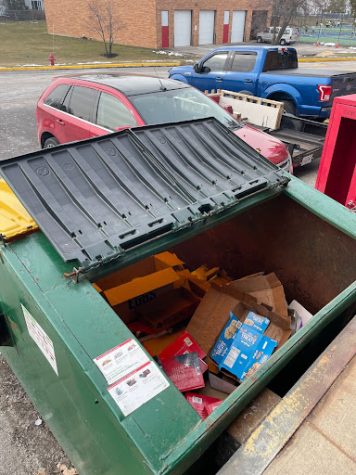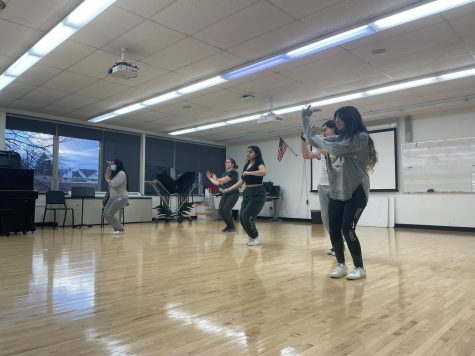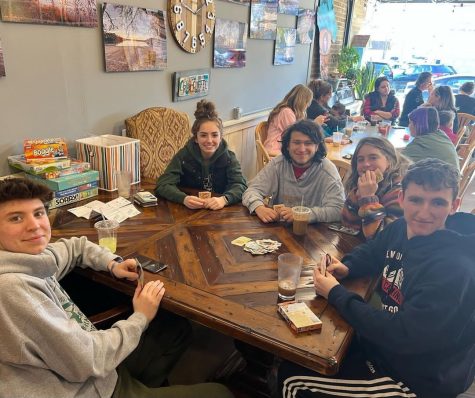Find ways to stay connected during quarantine
Photo submitted by Julie Wheeler
Julie Wheeler, social worker, shares a selfie from her school office on Jan. 25– the first day MHS returned to a form of in-person learning since March of 2020. She said, “It’s so nice to have students back in the building.”
March 2, 2021
During the COVID-19 pandemic, many people have found it more difficult than ever to keep up with their friends and family with whom they don’t live, but there are reasons and ways to stay connected, according to MHS social workers and psychologists.
One major inhibitor to staying connected with family and friends is people being intimidated to do so.
“Teens might think it’s awkward or weird to contact someone out of the blue that they haven’t talked to in a while, so they don’t do it. The reason being teens feeling it’s too awkward and/or weird to contact people they haven’t talked to in awhile,” Social Worker Julie Wheeler said. “They miss an opportunity to surprise or compliment the other person.”
Wheeler shared a tip she uses to reach out to someone she may not have talked to in a while.
“I tend to call people when [I] see or hear something that reminds me of them,” she said. “I will start the conversation with ‘I read this and thought of you.’ It’s a starting point for a discussion or sharing a memory.”
Something else that might be preventing someone from touching base with companions is the fear of being a bother to them. For example, some people worry they will be rejected, ignored, or seen as annoying when they reach out, said Social Worker Jonathan Mahoney.
“The important thing to do is to reach out when you need it and not try to come up with reasons why you shouldn’t,” Mahoney said. “Allow others to respond naturally; don’t try to be a mind reader [about how they may respond].”
The psychologists and social workers also gave reasons to why its important to stay connected.
“Feeling connected and having positive relationships with others are important for our mental wellness,” Psychologist Marisa Graham said. “Everyone has been affected differently by the pandemic; however, we are all affected by it. Checking in on one another and staying connected helps us cope with the challenges.”
Lauren Fairweather, a school psychologist intern at MHS, said staying connected is important because of its effects on mental health.
“During the pandemic, we are not allowed to physically see others, which can cause us to feel disconnected from the important people in our life and the world,” she said. “It’s important to stay connected with family and friends to help us feel less lonely and isolated.”
Both Graham and Fairweather identified feeling stressed, anxious, isolated, depressed and/or lonely as effects of lack of communication with friends or family.
Mahoney expanded on these ideas as well.
“We all rely on those around us for feedback,” he said. “We often check in with friends and family about different decisions we make and whether or not they are beneficial. We also rely on those around us to process our experiences and feelings about what is happening in our lives. Keeping up with these interactions can be a great source of support and validation.”
Wheeler shared a similar idea.
“Relationships can keep us grounded in the here and now and engaged in the world around us,” she said. “For people who experience anxiety, past actions and future what-ifs can immobilize them. Interacting with loved ones can reground them in the now.”
Besides focusing on relationship-building during the pandemic, people can also start considering how interactions will be when people begin re-engaging with others face-to-face.
“Without a doubt, in-person interactions will feel odd when we can start doing that again,” Mahoney said. “There are going to be awkward interactions in the future, but that simply offers another shared experience. Everyone will be re-learning how to be together again, so everyone will be in the same boat.”
Mahoney also gave tips on how to reconnect with family and friends once we can all start interacting in-person again.
One tip revolved around telling people they were missed, are valued and are appreciated in an honest and genuine way.
“Hopefully freely expressing to others how much they mean to you is something positive that comes from this situations,” Mahoney said. “As the old saying goes, ‘You don’t appreciate what you have until it is taken from you.’ Most of us truly value the care and connection from those around us, but we don’t always let others know how much they mean to us.”
He added, “Hopefully we don’t miss future opportunities to let those closest to us know how much we value them.”
Fairweather’s tip for reconnecting revolved around making sure the person with whom one is reconnecting feels comfortable in the process.
“I think the best way to do this is to ask the person what they are comfortable with since some people will want to see others right away while others will want to re-engage with people slowly,” Fairweather said. “This can help prevent people from feeling uncomfortable or potentially straining a relationship.”
Wheeler said she is hopeful we can just pick up where we left off in March of 2020 but wasn’t sure if this would be the case.
“But we all have perfect conversation starters like, ‘Wow, how did you handle the lockdown/remote learning/summertime?’ ‘What did you miss most during the quarantine? I missed…’ ‘Did you pick up any new skills or hobbies since I saw you last?’” Wheeler said.
For students feeling they are going to struggle transitioning back to in-person learning or are currently struggling, Graham gave some recommendations for how to cope.
“Recognize that there will be differences in the pace with which people re-engage,” she said. “For students finding it difficult to adapt back, it can really help to reach out to a social worker, counselor or school psychologist to help make a plan.”


![MHS Alum Trey Baker hosting a MBK rising event on February ninth at the MHS annex. Said Baker, “I’m just really excited [and] super grateful for the community of Mundelein, for our educators, for our administration, at MHS who are really buying into this.”](https://mhsmustang.com/wp-content/uploads/2023/03/TreyBaker-350x475.jpg)

